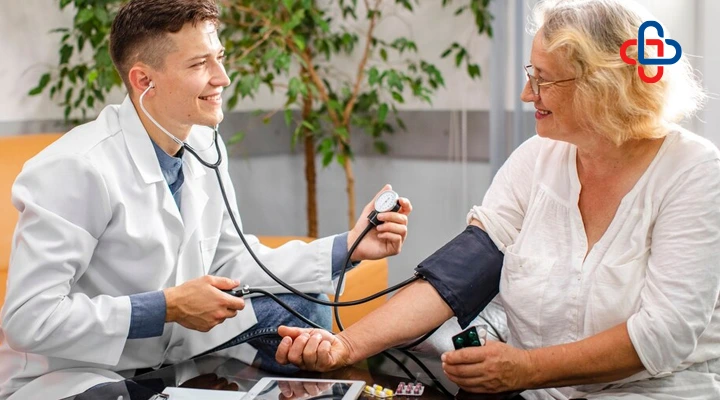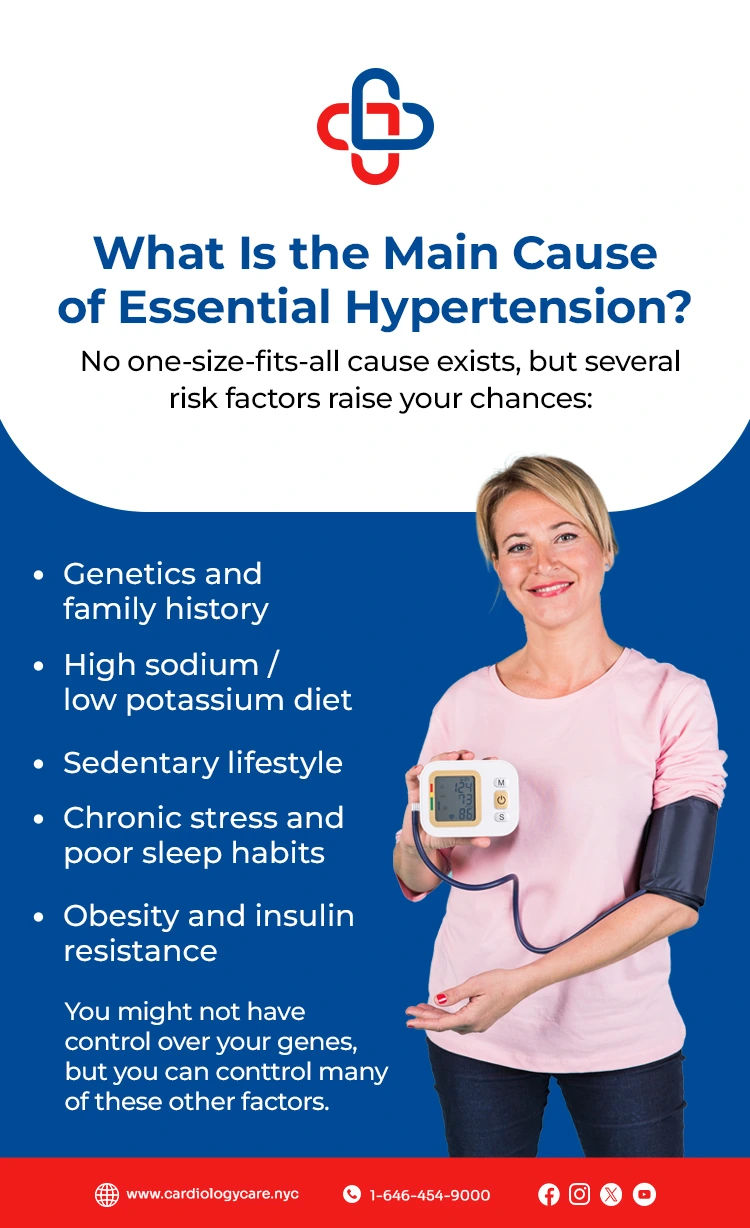You’ve just been told you have high blood pressure, specifically, essential hypertension. What does that even mean? And how do you know which treatment is best for you?
That moment can feel overwhelming. You’re not alone. Essential hypertension (also called primary hypertension) is the most common type of high blood pressure. And unlike secondary hypertension, which has a clear cause like kidney or thyroid disease, essential hypertension doesn’t come with a simple explanation. It develops gradually, influenced by a mix of genetics, aging, and lifestyle choices.
So, how do you make sense of the treatment options? Let’s break it down.
Table of contents
What Is Essential Hypertension?
Essential hypertension is high blood pressure that isn’t caused by another medical condition. It typically develops over years and is often linked to family history, diet, stress, and physical inactivity.
In its early stages, it’s sometimes referred to as benign essential hypertension. That doesn’t mean it’s harmless. It simply means it hasn’t yet caused damage to organs like the heart or kidneys. Left untreated, it can still lead to serious complications.
Primary Hypertension vs Secondary Hypertension
Here’s a quick snapshot:
Primary (Essential) Hypertension
- Develops over time
- No single identifiable cause
- Makes up 90 to 95% of hypertension cases
Secondary Hypertension
- Caused by an underlying condition (e.g., kidney disease, hormonal issues)
- May improve or resolve when the root cause is treated
Why it matters: Treatment strategies vary depending on the type, so getting an accurate diagnosis is crucial.
What Is the Main Cause of Essential Hypertension?
No one-size-fits-all cause exists, but several risk factors raise your chances:
- Genetics and family history
- High sodium / low potassium diet
- Sedentary lifestyle
- Chronic stress and poor sleep habits
- Obesity and insulin resistance
You might not have control over your genes, but you can control many of these other factors.
Recognizing Essential Hypertension Symptoms
If your blood pressure varies or seems inconsistent, your doctor may suggest a Holter monitor. This wearable device records heart activity over 24 to 48 hours, revealing patterns that a one-time reading might miss.
Most people won’t notice symptoms, which is why hypertension is often called the silent killer.
Still, some may experience:
- Persistent headaches
- Blurred vision
- Dizziness or fatigue
- Shortness of breath
Early blood pressure screening is your best defense. It catches issues before symptoms (or damage) even begin.
Essential Hypertension Treatment Options
There are several proven ways to treat essential hypertension, and choosing the right one depends on your unique health needs, goals, and daily habits.
Lifestyle Changes (Your First Line of Defense)
- DASH diet: Rich in fruits, veggies, whole grains, and low-fat dairy
- Exercise: Aim for 30 or more minutes daily (walking, cycling, swimming)
- Weight management
- Reduce salt, quit smoking, manage stress
Medications for Essential Hypertension
Your provider may recommend a stress test to evaluate how your heart handles physical activity. This helps fine-tune your treatment plan, especially if lifestyle changes alone aren’t enough. Common medications include:
- Diuretics: Help your body eliminate excess sodium and fluid
- ACE inhibitors / ARBs: Relax blood vessels
- Calcium channel blockers: Prevent calcium from entering heart and vessel cells
- Beta-blockers: Slow heart rate and reduce workload (used selectively)
Your doctor will consider your age, blood pressure levels, and other health conditions before prescribing.
How to Choose the Right Treatment for You
At Cardiology Care NYC, a cardiology consultation helps create a treatment plan tailored to your medical history, symptoms, and goals. This ensures effective and manageable care designed specifically for you.
- Your baseline blood pressure readings
- Whether you have other conditions like diabetes or heart disease
- Your age, risk level, and readiness for lifestyle changes
Regular follow-ups help adjust the plan as needed. Think of this as a journey, not a one-time fix.
Prevention and Long-Term Management Tips
Heart health screening helps catch risk factors early so you can take action before problems develop. Staying proactive with regular checks keeps your cardiovascular health on track.
Even on medication, your lifestyle plays a huge role. Here’s how to stay ahead:
- Track your blood pressure at home
- Keep active (movement is medicine)
- Maintain a healthy weight
- Limit alcohol and caffeine
- Reduce stress with meditation, therapy, or hobbies
Early action can help prevent hypertension or keep it from progressing.
Conclusion:
Essential hypertension isn’t something you cure quickly, but with the right combination of lifestyle changes and medication, it can be managed effectively to prevent serious complications. The most effective treatment is one tailored to your specific health profile, lifestyle, and long-term goals. Staying consistent with your plan, working closely with your healthcare provider, and making informed choices all play a crucial role in maintaining long-term heart health.
Frequently Asked Questions
Can essential hypertension affect young adults?
Yes, it can. Poor diet, obesity, and stress make young adults increasingly at risk.
Is it safe to exercise with essential hypertension?
Yes. Moderate exercise is beneficial, but consult your doctor before starting.
How does untreated essential hypertension affect other organs?
It can damage the heart, kidneys, brain, and eyes over time, often without symptoms.
Can emotional stress alone cause essential hypertension?
Not alone, but chronic stress contributes to high blood pressure when combined with other factors.
Disclaimer
This blog is for informational & educational purposes only and does not intend to substitute any professional medical advice or consultation. For any health-related concerns, please consult with your physician, or call 911.

